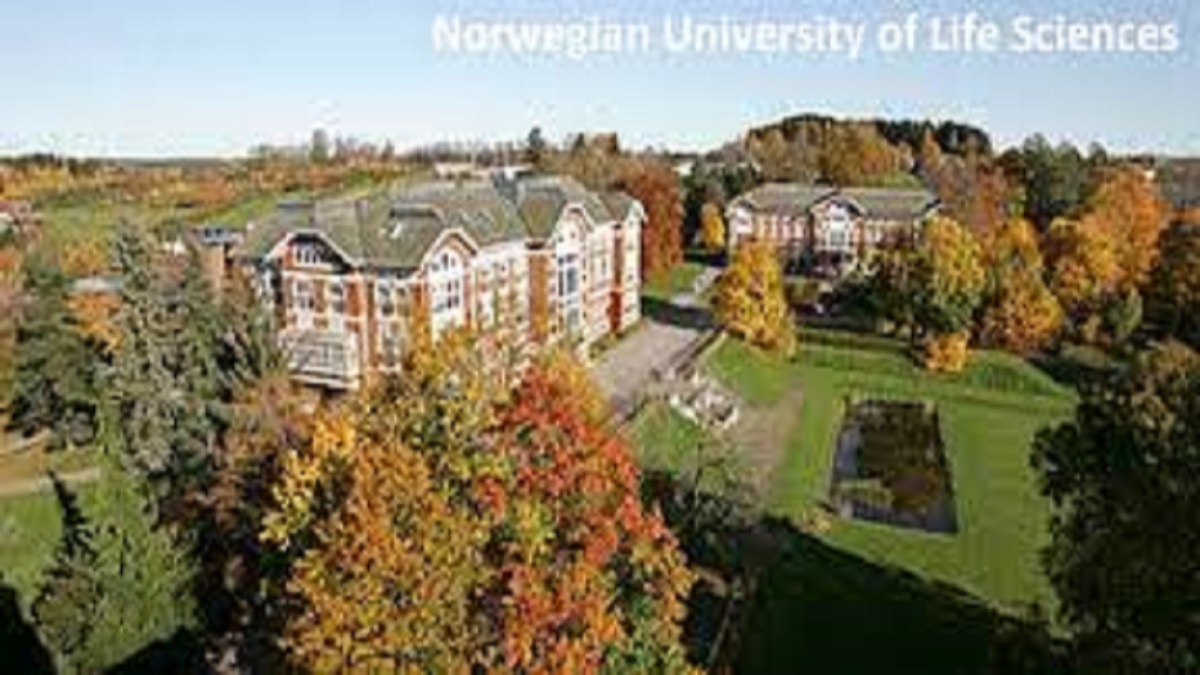
The Faculty of Science and Technology at the Norwegian University of Life Sciences (NMBU) has vacant two permanent position as Professor / Associate Professor within robotics, sensor technology, and automation.
The Robotics group is a part of the department of Mechanical Engineering and Technology Management. The group consists of four full-time professors/associate professors and counts in total about 25 people including 10 PhD students.
One of the vacant positions needs to be filled by a Professor who can take on the responsibility for the masters program in applied robotics and be the head of the robotics group. The candidates should have good communication skills and be able to initiate research collaborations between the different units at NMBU and outside NMBU, both national and international.
The Norwegian University of Life Sciences has a strong position internationally within robotics, sensor technology, and food automation, and looks upon the fields as core technologies to solve the challenges the world is facing in food production. Automation is needed to reach the UN sustainability goals; to increase food production by 60% within 2050 on decreasing available land, precision farming is needed. The food industry is facing major labor shortage challenges and hence automation is needed in the full food value chain. The University has a strong ecosystem of academic resources and startup resources which has produced both strong academic results, a master’s program in robotics, and a range of very successful startup companies.The robotics group works within agricultural robotics and food automation. Within agricultural robotics the group works within areas such as autonomous, robust and reliable navigation, localization and mapping (e.g., SLAM) for mobile robots, mechanics, modeling and control, and manipulation. The main application domain is agricultural robotics operating both indoors in tunnels and greenhouses as well as in outdoor environments. Within food automation the group works with interaction between robots and objects that are normally found in the food industry, such as soft, non-rigid, and moving objects. This includes sensing, control, and manipulation of soft objects.
The group has previously developed the Thorvald robot, a highly versatile robot specifically designed for the agricultural domain and is currently involved in a number of research projects within agriculture and food production. The group has a wide variety of robots available in a well-equipped lab.
Further information about the robotics group: http://www.nmbu.no/go/robotics
The successful candidate is expected to conduct research and development within the areas of robotics, sensor technology, and automation. The candidate may find interesting and relevant research topics within this list, but other areas could also be relevant:
- Autonomous navigation that allows robots to analyze and understand agricultural environments and unstructured objects, adapt to changing conditions caused by seasons and plant growth, and allow mobile robots to operate robustly in such challenging conditions.
- Safety: in particular recognition of dangerous situations for the robot and its environment; sensor systems for food quality.
- Advanced machine vision for navigation in agricultural environments. Such abilities should result in robust and reliable solutions for navigating unstructured environments and objects.
- Advanced machine vision for manipulation in agricultural environments and food automation. Such abilities will enable a range of applications including selective harvesting, precision operations (e.g., weeding) and agronomy support (e.g., yield prediction, soil health analysis).
Machine learning and AI for the agricultural and food domain.
Main tasks
The main responsibilities for both positions are teaching and supervision within the relevant areas, participating in existing research projects and initiating new ones. Further, the candidates are expected to promote the research by communicating with industry and society. Robotics, sensor technology, and automation are important in many research areas of NMBU, and the candidates will be expected to collaborate with several groups at the university.
The robotics group team leader is expected to lead the group and contribute to positioning the team as a world leading agricultural robotics and food automation group. One of the positions will be responsible for teaching navigation/SLAM etc for master students in “Applied robotics”
The main tasks for both positions will be:
- Teaching relevant robotics courses
- Supervision of M.Sc.- and Ph.D. students
- Conducting research in relevant fields. Participation in existing research projects and initiate new research projects and secure further funding
Other tasks will be:
- Participation in the development of the study program and the department
- Administrative tasks
- Engaging with society through external collaboration, to participate in securing external research funding, and to contribute to NMBUs strategic goals.
NMBU
Competence
Required Academic qualifications for the position as Professor
- Doctoral degree in the subject area concerned. PhD degrees taken at non-Norwegian universities must be approved as equivalent to a Norwegian PhD degree.
- Professor competence at the scientific level in accordance with international or national standards
- Documented educational competence at the level of professor
Required Academic qualifications for the position as Associate professor
- Doctoral degree in the subject area concerned. PhD degrees taken at non-Norwegian universities must be approved as equivalent to a Norwegian PhD degree.
- Documented educational competence at the level of associate professor. If you do not meet the requirement, you can still be considered qualified for the position, as you will be obliged to document educational competence within two years of employment.
Required Academic qualifications for both positions:
- High level of skill and experience in the area concerned
- Good track record of publications in highly ranked journals and conferences
- Hands-on experience from working with robots, sensors, and automation
The following experiences and skills will be emphasized:
- Track record in securing funding for research and development
- Experience from teaching, supervising and dissemination
- Experience from large research projects and/or industry
Language skills:
- Proficiency in English, written and oral, is required
- Proficiency in Norwegian, Danish or Swedish language is an advantage. Applicants not fluent in Norwegian/Danish or Swedish language, will be required to document Norwegian language at proficiency level B2 within three years of employment.
Personal suitability will be given weight.
NMBU wants more women in permanent scientific positions. Women are therefore encouraged to apply.
Remuneration and further information
- The Professor position is placed in government pay scale position code1013 Professor, salary grade 79-94 (NOK 814 900 – 1 189 400).
- The Associate Professor position is placed in government pay scale position code 1011 Associate Professor, salary grade 68 – 84 (NOK 636 700 – 935 300).
The position also contains an onboarding package;
New academic staff, who are not already a main supervisor, will be given priority when it comes to getting fully financed Ph.D. students.
The Robotics group is currently involved in large research projects, so there are good opportunities in getting research funding and PhD students from day one.
If you want to get to know Realtek prior to you application, please contact us and we will seek to offer a tour on campus to show you the work environment and staff. You can also visit us digitally.
For further information, please contact:
- Head of the department, Associate professor Odd Ivar Lekang, e-mail: odd-ivar.lekang@nmbu.no; phone: + 47 958 76 609
- Associate professor Ellen Altenborg, e-mail: ellen.elisabeth.altenborg@nmbu.no; phone: +47 90 53 53 48
- Professor Pål Johan From, e-mail: pal.johan.from@nmbu.no ; phone +47 906 909 32
The engagement is to be made in accordance with the regulations in force concerning State Employees and Civil Servants, and the acts relating to Control of the Export of Strategic Goods, Services and Technology. Candidates who by assessment of the application and attachment are seen to conflict with the criteria in the latter law will be prohibited from recruitment to NNBU.
Pursuant to the Personal Data Act, we will hereby notify you that the report of the expert committee will be sent to all applicants.
General Information to applicants
Application
To apply online for this vacancy, please click on the ‘Apply for this job’ button above. This will route you to the University’s Web Recruitment System, where you will need to register an account (if you have not already) and log in before completing the online application form.
Application deadline: February 20, 2023
Applicants invited for an interview will be asked to present verified copies of diplomas and certificates.
Your application must include:
- Up to ten publications selected by the applicant as the most relevant must be attached to the application. If it is difficult to identify the contribution of the applicant in multiple-author publications, a short explanation about the applicant’s part of the work is suggested.
- Applicants must enclose documentation of their educational/teaching competence, called an educational directory.
Links to videos of robots operating in real-world environments is encouraged.
About The Faculty of Science and Technology
The Faculty of Science and Technology (REALTEK) develops research-based knowledge and educates civil engineers and lecturers needed to reach the UN’s sustainability goals. We have approximately 150 employees, 70 PhD students and soon 1500 students. The education and research at REALTEK cover a broad spectrum of disciplines.
This includes data science, mechanics and process engineering, robotics, construction and architecture, industrial economics, environmental physics and renewable energy, geomatics, water and environmental engineering, applied mathematics as well as secondary school teacher education in natural sciences and use of natural resources such as in agriculture, forestry and aquaculture. The workplace is in Ås, 30 km from Oslo.
What is it really like to work at the Faculty of Science and Technology (REALTEK) at NMBU?
– Guided tour of the Faculty of Science and Technology on Vimeo
The Norwegian University of Life Sciences (NMBU)
NMBU has a particular responsibility for research and education that secures the basis for the life of future generations. Sustainability is rooted in everything we do and we deliver knowledge for life. NMBU has 1,900 employees of which about 500 phd scholarships and 6,700 students. The university is divided into seven faculties.
NMBU believes that a good working environment is characterised by diversity.
We encourage qualified candidates to apply regardless of gender, functional ability, cultural background or whether you have been outside the labour market for a period. If necessary, workplace adaptations will be made for persons with disabilities. More information about NMBU is available at www.nmbu.no.





